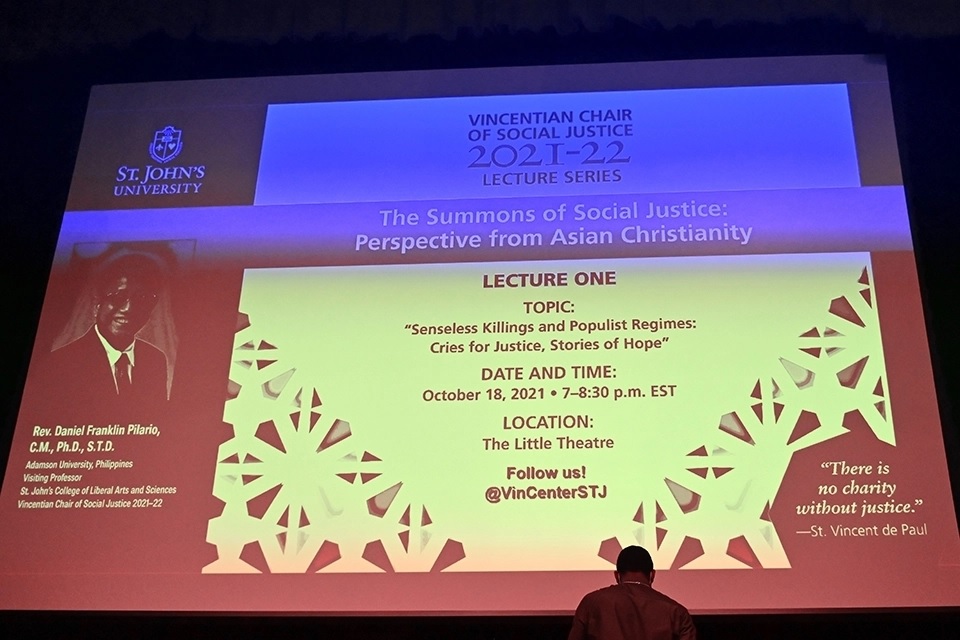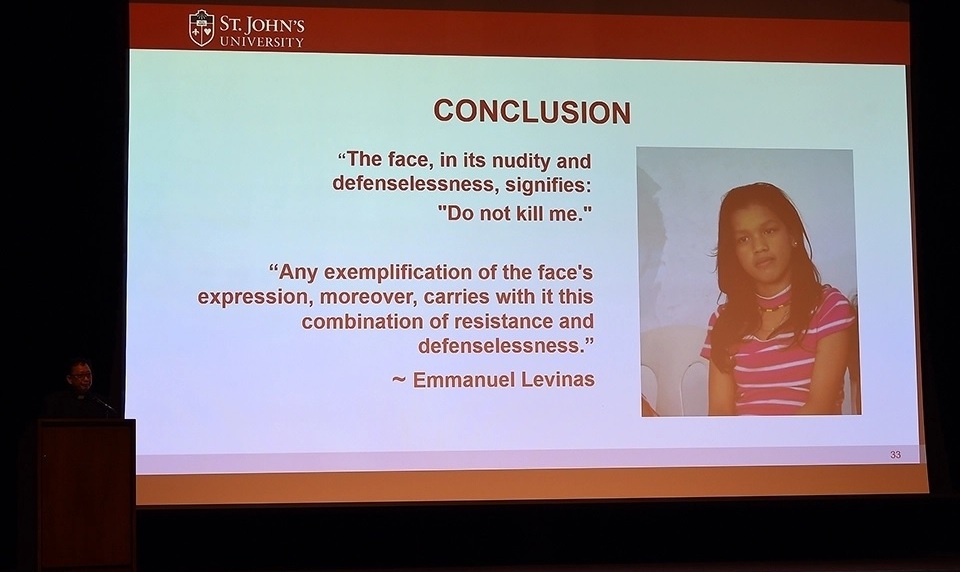Vincentian Chair of Social Justice Lecturer Discusses Scourge of Extrajudicial Killings in Philippines
(Accesssed and extracted from the News and Media page of the St. John's University website, 25 October 2021)
For the last five years, the Philippines has been beset by a controversial war on drugs that focuses on those allegedly addicted rather than its systemic causes. To date, an estimated 30,000 young men have been targeted for extrajudicial killings by local police; their names are placed on “hit lists” and then they are summarily executed.

Rev. Daniel Franklin Pilario, C.M., Ph.D., S.T.D., has ministered to the families of these men, providing comfort and solace in the wake of these senseless acts. More importantly, he has risked his own safety by using various platforms to speak out against this policy.
Fr. Pilario has been selected as this year’s holder of the St. John’s University Vincentian Chair of Social Justice; the theme for his lecture series is “The Summons of Social Justice: Perspectives from Asian Christianity.” His first lecture, “Senseless Killings and Populist Regimes: Cries for Justice, Stories of Hope,” was held on October 18 in The Little Theatre on the Queens, NY, campus.
“In our country, much of our view of the world is filtered through American and European sources,” noted Rev. Patrick J. Griffin, C.M., Executive Director, Vincentian Center for Church and Society. “Fr. Pilario invites us to take another look, but from an Asian vantage point.”
“Questions of justice know no national boundaries. Allowing our eyes and ears to be opened to the sufferings of marginalized people ensures that they will not go unnoticed and unheard. Fr. Pilario brings that gift to us.”
Philippine President Rodrigo Duterte has made the war on drugs his signature program, Fr. Pilario explained. “His genius was to tap into an everyday trouble and irritant of ordinary families—drug addiction—and transform it into a national issue, as all populist leaders do. The drug addicts are caricatured as pests. They have lost their minds. They are inhuman, almost like an animal, thus making it easier to accept that they can be killed.”
Fr. Pilario noted that killing has now become an act of heroism—protecting the youth from the menace of drug addiction to achieve a better and “drug-free Philippines.” He added that paid influencers on social networks echo the propaganda line of a very popular president. Police are alleged to be paid $200 to $300 per kill, and funeral homes, with advance knowledge of an operation, grossly overcharge bereaved families.
“There seems to be a direct link between violence and right-wing populism,” Fr. Pilario posited. “Such violence is expressed in different forms: racism, xenophobia, nativism, Islamophobia, anti-immigrant feelings, hate crimes, etcetera. In some countries, the violence is rhetorical. In the Philippines, it is literal—both of which are real and deadly.”
One definition of populism, Fr. Pilario observed, is the concept of “us” against “them.” The insiders are the “true people,” or the original population. The outsiders are the immigrants, foreigners, and minorities who encroach on the country’s economic resources, pushing the locals out of work. Like all populist leaders, President Duterte constructed a crisis and justified the continuous killings with the aid of social media, Fr. Pilario said.
Despite this reign of terror, people in the Philippines have banded together to fight extrajudicial killings. “Mothers and widows themselves do not cower in fear. They sue the policemen with the help of volunteer lawyers,” he said, and lean on each other for support.
Motivated by a need to feed their children, they have created sewing shops where they craft personal protective equipment. “One widow told me, ‘Our husbands were killed by armed men wearing face masks. Today we sew face masks—not as instruments of death, but of life.’”
Due to President Duterte’s popularity and the many tactics aimed at silencing dissent, Fr. Pilario said it is difficult to speak out. “My friends and family warned me to just keep quiet.” He added, “What, then, is the meaning of my priesthood? Even deeper, what, then, is left of my humanity, if I do not make a stand with the victims?”
Prior to the lecture, a group of students from Philippine-Americans Reaching Everyone (PARE), a St. John’s student club that promotes awareness of the Philippine culture, had dinner with Fr. Pilario in the D’Angelo Center. Alison Tacderas, a Biology major and President of PARE, said it was important for them to know the situation in the Philippines so they could inform their members.
Martina Coronal, a Speech-Language Pathology and Audiology major and officer of PARE, noted the Philippine government downplays these incidents in the international press. “It’s really interesting and important to hear from someone who’s on the ground there and experienced it firsthand. It really opened my eyes.”

Click the link below to read this article from the News and Media page of the of St. John's University website:


